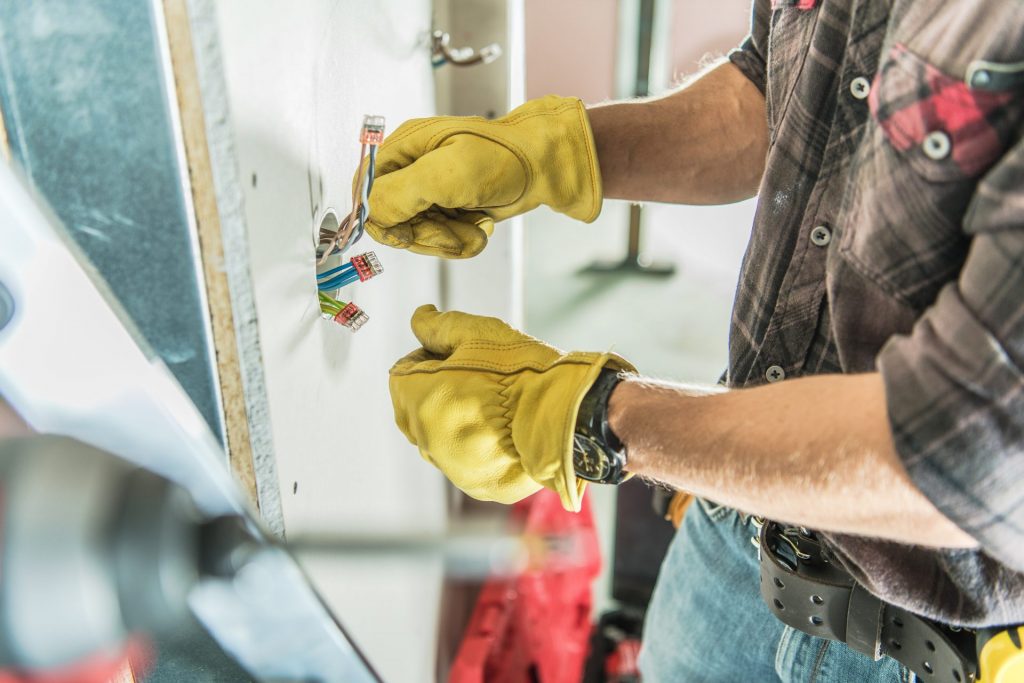A Commercial Electrician Serves All Types of Businesses
If you own or manage a business or industrial use space, you will need a good commercial electrician to keep your facility running smoothly. Whether it’s new installation, upgrades to existing space, or routine repairs, commercial electrical projects require different expertise than residential work.
Some reasons you may call on this type of business include:
- Space improvements – an experienced firm can help you with the design decisions and then with the electrical requirements for new space or remodeling.
- Security needs – including motion detectors, security lights, and backup generators.
- Lighting – you may want this installed for aesthetic reasons, security, or both. This also includes lighting for signage, parking lots, walkways, etc.
- Energy use analysis – an experienced team can evaluate your systems and tell you what ways you may be able to save on energy costs.
- Upgrades – especially if your business is in an older building, you may have to make some changes to your electrical setup to make sure it is up to code standards. An experienced company will know what is required and how to keep costs as low as possible to meet local, state and federal requirements.
- Generator installation – you may want to install a generator that will automatically start if the power goes out. Since this is tightly integrated with your electrical system, you should only use a firm experienced in this type of equipment and installation.
- Routine maintenance – regular inspections and testing of equipment will help to ensure it is up to code and safe to operate.

Experience of Your Electrician
When it comes to the different fields, there are a few as we explained above. What you might also want to know is that there is also more than one level of education and experience that an electrician can have, and each level has its own certification and experience. There are particularly three categories in which an electrician can fall, and they are:
Apprentice – These are electricians who have recently started their training and are working towards getting a journeyman’s license. Many of the times, they are new to the field, and often work side by side with their supervisors, who are usually licensed journeymen, or even master electricians in some cases.
Journeymen – These electricians are professionals that have a certification and are just starting their journeys as licensed electricians. They’ll work unsupervised often, and they handle many different machine applications and power tools in order to do their jobs.
Master Electricians – The masters and jacks of all trades are master electricians. They have received all of their certifications in different areas as a journeyman, and ultimately landed their master electrician’s license. By doing so, they also have more training and experience on various applications and are excellent for any job, commercial or residential.
What Type of Training and Education Is Required to Become a Commercial Electrician?
commercial electricians need to be licensed before they can perform work on electrical systems. To help with the preparation of obtaining a license, these electricians can attend a sponsored apprenticeship or enroll in an associate’s degree program. To endure the training process, aspiring commercial electricians must obtain a high school diploma or the equivalent. Since circuit calculations are required on the job, individuals who seek a career as an industrial electrician should take courses in algebra. Aspiring electricians also take training programs that teach pneumatics and the principles of hydraulics.
Why Should You Hire a Commercial Electrician?
It’s a good idea to hire a commercial electrician if you’re planning on setting up a new business location, are updating an old electrical system, you’re “going green” and want a more eco-friendly approach to electricity, or are dealing with electrical issues. While doing DIY work might be tempting it is never a good idea, especially since you are running a business that will be serving the public. A commercial electrician can ensure safety for your business and its customers.
What Is the Difference Between Industrial Wiring and Residential Wiring?
The differences between industrial wiring and residential wiring are the insulation, voltage load, and installation process. Residential wiring is typically run through walls and attic crawl spaces in a single phase design, and it uses less voltage due to lower electrical load. Industrial wiring uses a three-phase design to create higher output to power high voltage equipment and multiple systems. Heavy-duty insulation protects industrial wiring from corrosive liquids or gasses. Sensitive and power-hungry machinery often require special, heavy-duty outlets.

The Difference Between Commercial, Industrial & Residential Electricians
As their name implies, residential electricians work in homes. They use single phase power supplies – 120 or 240 volts – run romex cable, and wrap their wiring in sheathed insulation that generally is hidden from view. This wiring approach helps minimize exposure and damage to the wires, as well as protect homeowners from electrical shock.
Commercial electricians work in stores and offices, usually installing power outlets and lighting. Their wiring typically follows a three-phase approach, with two smaller “legs” running one voltage and a larger “leg” running a higher voltage. Depending upon a business’ power needs that could be 120 volts/208–240 volts, or 277/480 volts.
Commercially, the three-wire system is used so each wire carries an overall lighter workload. Commercial wiring also ends to remain exposed, although it usually is run inside conduit for protection. In other words, unlike residential wiring that runs in rafters and behind walls, commercial cables may run along the exposed sides of ceilings and walls.
Industrial electricians are basically commercial electricians who primarily work in factories, chemical plants, and mines, etc. Like commercial electricians, they use a three-phase power set-up; however, instead of running MTC or MC cable, they mostly work with RMC conduit that powers motors and instrumentation or control circuitry.